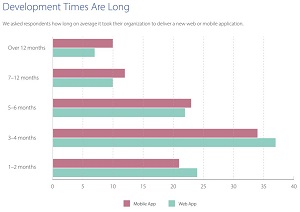News
Delivering Mobile, Web Apps Often Takes More than 4 Months, Says Survey by Low-Code Vendor
- By David Ramel
- May 16, 2019
Amid soaring demand for enterprise mobile and Web apps and scarce dev talent, delivery times often average more than 4 months, says a new survey from low-code tooling vendor OutSystems.
The company, in publishing its sixth annual research report on "The State of Application Development," said, "46 percent of respondents said the average time to deliver a Web or mobile application is five months or more."
Those timeframes were reported as demand for app development in 2019 has increased 60 percent, with 64 percent of respondents reporting they have app development backlogs to meet that demand.
Note that much of the report focuses on low-code development, the specialty of OutSystems, though the company said it primarily surveyed more than 3,300 development-related professionals worldwide who were not customers -- using third-party media -- to limit fan bias.
The report said development times are somewhat faster than earlier surveys, but not for all respondents.
"Last year, 54 percent of respondents said the average time to deliver a Web application was 4 months or less," the report said. "This year, that figure has risen to 61 percent. Mobile app development is little changed since last year, with just 55 percent on average saying that they deliver apps in 4 months or less."
 [Click on image for larger view.]
App Delivery Timeframes (source: OutSystems)
[Click on image for larger view.]
App Delivery Timeframes (source: OutSystems)
The survey zeroed in on respondents who reported delivery times of more than 5 months and discovered mobile application development takes longer. Some 45 percent of mobile developers were in that range, compared to 39 percent of Web app developers.
"In the case of Web applications, this represents a marked improvement in speed compared to our 2018 survey, in which 46 percent of respondents said delivery of Web apps was taking 5 months or longer," OutSystems said.
The top 5 challenges that slow down app delivery were listed as:
- Legacy system integration/APIs missing or needs enhancing -- 16 percent of respondents
- Fuzzy/changing requirements -- 15 percent
- Testing/QA -- 14 percent
- Security protection and penetration testing -- 13 percent
- Data privacy concerns -- 12 percent
Other survey highlights as listed by the company include:
- Development talent hard to find and keep: Most respondents have hired developers, 75 percent of respondents described app dev talent as scarce, and only 36 percent of organizations have larger app dev teams than a year ago. The numbers appear to show retention of app dev talent is an equally grave concern.
- Agile practices are still slow to mature: 60 percent of organizations have invested in agile tools and services in the past year. However, the average agile-maturity score was a lackluster 2.7 out of 5, meaning most organizations are still in the process of defining agile processes.
- Customer-centricity continues to rise: Over 60 percent of organizations have invested in customer-centric practices in the past year, including customer journey mapping, design thinking, and lean UX. For the new apps slated for development in 2019, those that will be used directly by customers or business partners were identified as most important.
Along with talent scarcity, massive backlogs and aging infrastructure, OutSystems highlighted enterprise development disruption and agility as top concerns.
"Our 2019 survey shows that many IT departments are facing a multitude of disruptive forces when it comes to digital transformation and application development,” said exec Steve Rotter in a statement. “The threat of digital disruption and the need for digital transformation has been a driver of IT strategy for years. Add to that the current uncertain global economic outlook, and it becomes obvious why business leaders are so concerned about agility today.”
About the Author
David Ramel is an editor and writer for Converge360.